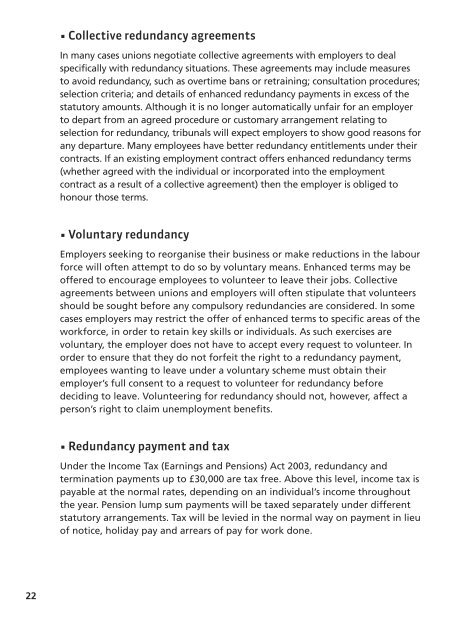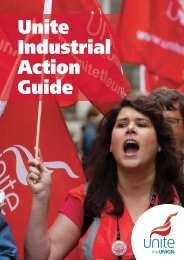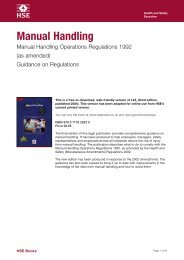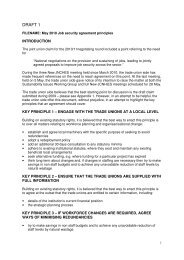Redundancy - Unite the Union
Redundancy - Unite the Union
Redundancy - Unite the Union
Create successful ePaper yourself
Turn your PDF publications into a flip-book with our unique Google optimized e-Paper software.
• Collective redundancy agreements<br />
In many cases unions negotiate collective agreements with employers to deal<br />
specifically with redundancy situations. These agreements may include measures<br />
to avoid redundancy, such as overtime bans or retraining; consultation procedures;<br />
selection criteria; and details of enhanced redundancy payments in excess of <strong>the</strong><br />
statutory amounts. Although it is no longer automatically unfair for an employer<br />
to depart from an agreed procedure or customary arrangement relating to<br />
selection for redundancy, tribunals will expect employers to show good reasons for<br />
any departure. Many employees have better redundancy entitlements under <strong>the</strong>ir<br />
contracts. If an existing employment contract offers enhanced redundancy terms<br />
(whe<strong>the</strong>r agreed with <strong>the</strong> individual or incorporated into <strong>the</strong> employment<br />
contract as a result of a collective agreement) <strong>the</strong>n <strong>the</strong> employer is obliged to<br />
honour those terms.<br />
• Voluntary redundancy<br />
Employers seeking to reorganise <strong>the</strong>ir business or make reductions in <strong>the</strong> labour<br />
force will often attempt to do so by voluntary means. Enhanced terms may be<br />
offered to encourage employees to volunteer to leave <strong>the</strong>ir jobs. Collective<br />
agreements between unions and employers will often stipulate that volunteers<br />
should be sought before any compulsory redundancies are considered. In some<br />
cases employers may restrict <strong>the</strong> offer of enhanced terms to specific areas of <strong>the</strong><br />
workforce, in order to retain key skills or individuals. As such exercises are<br />
voluntary, <strong>the</strong> employer does not have to accept every request to volunteer. In<br />
order to ensure that <strong>the</strong>y do not forfeit <strong>the</strong> right to a redundancy payment,<br />
employees wanting to leave under a voluntary scheme must obtain <strong>the</strong>ir<br />
employer’s full consent to a request to volunteer for redundancy before<br />
deciding to leave. Volunteering for redundancy should not, however, affect a<br />
person’s right to claim unemployment benefits.<br />
• <strong>Redundancy</strong> payment and tax<br />
Under <strong>the</strong> Income Tax (Earnings and Pensions) Act 2003, redundancy and<br />
termination payments up to £30,000 are tax free. Above this level, income tax is<br />
payable at <strong>the</strong> normal rates, depending on an individual’s income throughout<br />
<strong>the</strong> year. Pension lump sum payments will be taxed separately under different<br />
statutory arrangements. Tax will be levied in <strong>the</strong> normal way on payment in lieu<br />
of notice, holiday pay and arrears of pay for work done.<br />
22

















